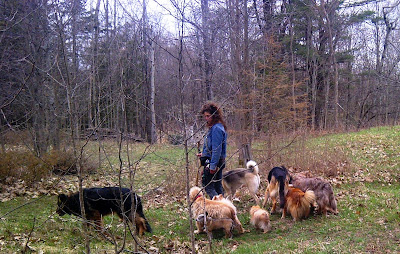Do Dogs Have an Edge Over Humans When it Comes To Intelligence
I would have to say yes – dogs have an intelligence that exceeds and defies many modern day humans…and within this concept resides the real key to understanding and training your dog...
Base and Refined Intelligence - Humans & Dogs
The First Intelligence, as I see it operates in the absence of refined thought. This form of intelligence has its
foundation in base instinct and inherited traits.
Your inherited traits determine your pre-disposition to be:
Your inherited traits determine your pre-disposition to be:
- An introvert or an extrovert
- Left Brain, or Right Brain.
- Left Brain Hemisphere;
- If you fall into this category you may have a pre-disposition to be:
- Naturally confident...
- Calm,
- Dominant;
- Tolerant.
- Right Brain Hemisphere
- If you fall into this category you may have a pre-disposition to be:
- Naturally insecure...
- Lacking in confidence;
- Nervous;
- Anxious;
- Fearful.
Base instinct can be seen in the behaviour of individual human beings and in the collective behaviour of multiple human beings. For example:
- When humans get together to form a crowd, which then due to various triggers results in a heightened degree of reactivity.
The trigger to this behaviour may be an event at which sudden violence, unfulfilled
expectation or fulfilled expectation – i.e.
team win at a sporting event, political success or failure at an
election count, occurs.
- One or more people in the crowd instantaneously react, and;
- Other individuals in the crowd respond;
- Either matching the state of the first people to react, or;
- Reacting in a polar opposite manner but with the same intensity;
- Within a matter of seconds (depending on the situation):
- Fear and panic spread, or;
- Violence, and/or;
- Avarice and greed may result in looting, theft, etc.
- This is commonly known as:
- Crowd Behaviour/Mentality or;
- Mob Behaviour/Mentality;
- In the extended animal kingdom (beings other than ‘mankind’) this same type of behaviour is referred to as Pack Mentality'
Non-Human Animals have much to teach mankind about being better
beings.
I always find it interesting but profoundly sad and indicative of our true intelligence that humans must have one term for human behaviour and another for non-human behaviour – though the ‘behaviour’ exhibited may be the same regardless of the type of animal (human or non-human).
I always find it interesting but profoundly sad and indicative of our true intelligence that humans must have one term for human behaviour and another for non-human behaviour – though the ‘behaviour’ exhibited may be the same regardless of the type of animal (human or non-human).
The
first type of intelligence present in mankind is firmly grounded in basic, raw
survival instinct and when not combined with refined instinct (see further
below) becomes a mentality that is exclusively:
- Me first;
- Solely for my good – not for the greater good;
- It must be noted that the first type of intelligence
- This is not leadership it is instead reflective of the widely misunderstood term ‘Alpha’
- While all of the above may promote short term survival, it does not promote long-term survival of an individual, a species or a planet.
- Also interesting to note...
- What is it that humans like so much about dogs?...
- A dog's selflessness;
- And what is it that many human beings have a very difficult time being?
- Selfless.
I never use the terms ‘dumb as
a cow’, ‘you follow like a sheep’ etc. Simply because the behaviours in
animals, that are so despised by humans are practiced by humans on a daily
basis. So the behaviour is, as I see it - just as human in nature as it may be
‘sheep like’ or ‘cow like’. I, like a dog do not enjoy hypocrisy so I consciously and spiritually choose (and endevour) not to be dismissive of non-human animals
Humans are animals and behave like animals – and that is
in accordance with nature and natural base instinct. This is a very important concept
that when tossed aside, due to human hubris:
- Limits the individual human's perspective;
- Which in-turn reduces that individual's potential for broader intelligence;
- Which leaves the door-open for that individual's intelligence to become narrowly focused to the point of obsession or extremism;
- Which when shared and adopted by other human beings, limits collective human intelligence;
- Which leaves the door-open for crowd mentality - the collective intelligence of the group of people may become narrowly focused to the point of obsession or extremism;
- BSL/DDA is not based on actual fact, but instead on a narrow, uninformed perspective;
- Human hurbris which then creates genocide...mass murder carried out by man'kind' whether done to humans or dogs it is genocide
I am a firm believer that dogs have all of the emotions that
humans have – with one exception, cruelty. Cruelty is not a
canine trait – it is a human trait which humans also share with some species of primates.
The Second Intelligence is refined intelligence – which consists of base and refined instinct - instinct
that has been layered and cultured with:
- Intuition;
- Common sense;
- Combined with;
- Logic;
- Self-awareness;
- Self restraint;
- Empathy;
- Consideration;
- Patience;
- Humility.
When a human seeks to:
- Understand and look at something from multiple perspectives (as opposed to a linear and/or judgmental perspective);
- Filtered through commonsense and self-discipline;
- The human is deploying mature, considered intelligence;
- Rather than allowing ire, raw unconsidered emotion and greed to take over.
When a human approaches their relationship with another
being using this type of intelligence: The human is enabled to see, learn and employ respect;
- By observing and assessing what truly presents to their senses;
- Rather than what they assume – based on preconceived notions.
- A perfect example of this is the typical notion that a dog is just a dog and cannot possibly be smiling.
- A conceit which is factually incorrect.
- Despite the fact that mankind has lived with dogs for 30 thousand years;
- The mass of humanity via our assumption that our (humankind’s) abilities outstrip that of other animals - has for most people, blinded them to the fact that dogs do smile.
If a greater percentage of humanity had more of the
second type of intelligence and less of the first, humans would not be so
self-destructive and generally destructive...we would not be so destructive and
disrespectful to other animals and the environment. After all, it is the human
animal – not non-human animals, that has and continues to negatively impact the
health of the Earth.
It is only by adhering to unrestrained, unconsidered
narrow perspective that a human can carry the expectation that in order to ‘train’
a dog:
- You dog, me human and for that reason alone dog, you shall do as I say;
- Your intelligence (dog) is such that I must either use:
- Treats, and/or;
- Silly tactics (i.e. dropping chain bags, marching you in different directions while on a lead, spraying you in the face, putting a pheromone collar on you, placing little piles of food on the floor so you understand that it is me the human feeding you, etc.), and/or;
- Force-dominance ‘training’.
When, in fact all the human needed to do was adopt the
same sense of self-awareness, self discipline and communication skills employed
by a well adjusted dog.
As Bernard Shaw so wisely said:
"The single biggest problem in communication is the illusion
that it has taken place"
Additional Influences on Intelligence
The Ability To Communicate Effectively
If you are not perceptive and are not a particularly good communicator your ability to understand others can be seriously and adversely effected.
And Then There is Heightened Sensitivity, Another Layer of Intelligence...
People (highly sensitive people - HSP)
Dogs (highly sensitive dogs - HSD)
It is my very firm belief - proven by the work that I do with such dogs - that dogs that are being diagnosed as ADHD are in fact not ADHD - they are instead HSDs.
If he/she is, heightened sensitivity is often a sign of great intelligence and can be a real asset - when understood and leveraged the right way - read all about HSDs here.
The Ability To Communicate Effectively
If you are not perceptive and are not a particularly good communicator your ability to understand others can be seriously and adversely effected.
- Do you know if you are a well-rounded perceptive and effective communicator?
- Does your ability to communicate match your dog's ability to perceive and communicate?
- Sight i.e...
- Observation of Body Language i.e...
- Facial expressions (dog and human faces);
- Micro body language - i.e. tension in the way you hold your hand;
- Macro body language - i.e. how you stand and occupy space;
- How you move - i.e. quickly in agitation or frustration, forcefully in anger, grounded, solid and calm, etc.
- Sound i.e...
- Pitch/timber of voice;
- Emotion behind voice;
- Scent i.e.
- If a human is nervous your scent can be slightly different than when you are calm - a dog's sense of smell is so acute slight changes in scent are perceptible;
- Breathing i.e.
- Short, deep, regular, withheld, etc.
- Extra Sensory Perception, and;
- Touch;
- Touch is a natural way to communicate; however how you touch and the state of mind you are in when you touch are of the most profound importance;
- Well adjusted dogs do not resort to harsh physical contact, they will always use the most minimal of interventions required by the situation at hand;
- Touch is a very important tool to communicate, but touch most be used properly, with respect;
- Touch can also be very important to assist a nervous, anxious dog;
- There are many respectful ways to use to touch to communicate to a dog.
And Then There is Heightened Sensitivity, Another Layer of Intelligence...
People (highly sensitive people - HSP)
Dogs (highly sensitive dogs - HSD)
It is my very firm belief - proven by the work that I do with such dogs - that dogs that are being diagnosed as ADHD are in fact not ADHD - they are instead HSDs.
Heightened Sensitivity...
- Is not a disorder;
- Is not a disadvantage when recognized, and;
- In fact it can be a valuable gift and advantage - which simply presents another layer of intelligence...for example:
- An HSP or HSD can quickly read the mood of another person (human/canine); can pick up the scent of illness, sense the onset of a seizure before it occurs, be extra attentive, etc.
If he/she is, heightened sensitivity is often a sign of great intelligence and can be a real asset - when understood and leveraged the right way - read all about HSDs here.
Understanding The Fine Details
Can lack of consideration in taking into account social and cultural norms affect your intelligence? Yes, because it can effect your judgement, your approach and your understanding of a situation.
Here is an example:
- White Anglo-Saxons males greet each other by shaking hands;
- French Quebecois may choose to greet each other with a light kiss on either side of the face;
- A white Anglo-Saxon - who has never seen the typical French Quebecois greeting; might react with great offense at having their personal space invaded to the point of being kissed on either cheek.
- Hand-shaking and/or kissing in greeting was not a traditional means of greeting for the indigenous peoples of Northern Canada.
- Why? Well for very practical reasons. In deep-cold temperatures hands can freeze if exposed to the cold, as well shaking someone's hands when your hands are encumbered by bulky gloves is not practical;
- Kissing is not practical when exposed to deep cold as lips can freeze;
- If instead the means of greeting was to rub noses, hands would remain warm and lips would remain safe from freezing. So rubbing noses to greet made greet sense for those living in the extremely cold climate of the north.
- If you do not have an awareness of how a culture, different from the one you grew up in functions you can make make social blunders which may be inconvenient at best and physically or psychologically damaging at worst.
A dog's natural method of greeting starts with the nose and not (as many humans insist on doing) invading immediate personal space with frenzied pats and high pitched voices. Invasion of personal space and lack of consideration in when and how we touch another being (human or canine)shows little attention to forethought, respect and for that matter intelligence.
Humans set their children up from a very young age to have limited intelligence when it comes to respecting and understanding a dog. Take a look at this and see if any of this sounds familiar to you.
The question I would pose to you is how does a human reflect a high level of intelligence when that human adamantly insists on greeting a dog in a manner that is disrespectful to a dog?
Would you go up to someone from another culture and greet them in a manner that was destabilizing or threatening to them? No, not if you were employing your intelligence.
Is it a reflection of ignorance, entitlement and lack of common sense? It seems to me that that mankind has a long standing notion that all other species on this earth are:
- Less intelligent than a human, and;
- Are due less respect than a human.
Dogs Have Many Similarities to Humans?
What happens if every time a child does something that is normal, polite, respectful - you give that child a treat? That child learns an altered state of normal...'for every normal thing I do in life I must be rewarded with a material thing (food, toy, etc.)'. Should the parent put this type of reward-based system in place, that child will become a mal-adjusted human being, who will likely also be overweight and have bad teeth. And what do you do if you are out with the child and forget to bring treats, you are not near s store , yet you need the child to 'behave themselves'. You will have a non-complaint, un-coperative little person on your hands.
And what happens when that person enters school and later then workforce - it will be difficult for that person to cope with real normal.
It is the same for a dog. A dog does not require treats as an incentive to perform a normal, social skill - adult dogs do not give puppy's treats..the adult dog simply provides the puppy with clear, respectful direction. The puppy complies. It is only when the human is an uninformed communicator that treats are required to get a puppy to comply to normal behaviour.
So, who has greater intelligence:
- The mother dog who teaches her puppies social skills by using clear communication, or;
- The human who does not grasp how to communicate effectively and therefore must entice a puppy with treats?
So having read the above, now consider, who is more intelligent – dog or human.
For me, personally - as I wrote on the ‘Tales Page’ of my
website some years ago…
“I recognize that I know a little about many things and everything
about nothing. It is this realization that inspires me to learn at every
opportunity, every day”
Dogs are amazing – you just have to forget many of the human
conceits you have learned about dogs and instead do what I do, what I teach my
clients to do and as Edward Hogland so perfectly expressed…
“In order to really enjoy a dog, one dosen’t merely try to train
him to be semi-human. The point of it is to open oneself up to the possibility
of becoming partly dog.”
To correct a dogs 'behaviour' you must:
- First correct the human's behaviour, and at the same time;
- Communicate effectively with the dog;
- Ensure that there is proper structure in the dog's daily life:
- Which includes closing the gaps in all of 'little behaviours' (that occur in the span of a typical day) which feed the larger 'unwanted behaviours' (what most people see as the' dog's issue').
A dog's behavioural issues start with
a gap in psychological fulfillment, so for example the dog has been asking for
direction and the human either has never seen ‘the ask’, does not understand ‘the
ask’, or answers the ‘ask’ the wrong way. The lack of psychological fulfilment
then results in a physical reaction to the situation where the ‘ask was not
satisfied with a logical, well adjusted, properly aligned, directive response.
The problem does not reside in the dog but, instead in the human's inability to
understand how to properly communicate. In addition to all that was discussed above, some dogs just like some people are hypersensitive. Dogs that are hypersensitive are
even more adversely affected by poor communication on the part of their humans.
Take a quick read here and you will find an example of the great intelligence of dogs - sure to make you smile.
And with that I leave you to ponder the true intelligence of man v.s. dog.
Holistic Diet, Nutrition, Wellness Services Tailored to Your Individual Dog and Cat
For information about my holistic diet, nutrition and wellness services, visit my holistic wellness services page.
Maintain good health | Address acute and chronic health issues | Pre and post surgery support and recovery
My holistic wellness services are available worldwide via video consultation.
🌎 USA | Canada | UK | Europe | Australia | New Zealand | Asia | South and Central America | Africa | UAE
📱FaceTime | Facebook | Skype | WhatsApp
To set-up your holistic wellness consultation get in-touch via email, go to my contact me page.
Holistic Behavioral Services for Your Dog
For information about my holistic behavioral services, visit my holistic behavioral services page.
For dogs of all ages, sizes and breeds.
My behavioral services are available worldwide via video consultation.
🌎 USA | Canada | UK | Europe | Australia | New Zealand | Asia | South and Central America | Africa | UAE
📱FaceTime | Facebook | Skype | WhatsApp
To set-up your holistic behavioral session get in-touch via email, go to my contact me page.
Affiliations to Companies
✓ None.
✓ I don't sell food, supplements, or other products.
✓ I'm not aligned with any companies.
Article and graphics by Karen Rosenfeld.










